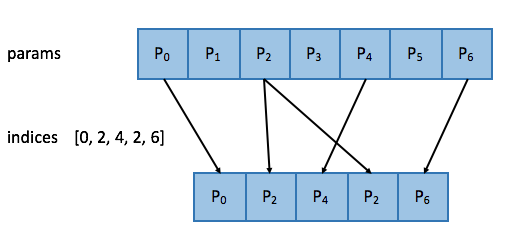mindspore.ops.gather
- mindspore.ops.gather(input_params, input_indices, axis, batch_dims=0)[source]
Returns the slice of the input tensor corresponding to the elements of input_indices on the specified axis.
The following figure shows the calculation process of Gather commonly:

where params represents the input input_params, and indices represents the index to be sliced input_indices.
Note
The value of input_indices must be in the range of [0, input_param.shape[axis]), the result is undefined out of range.
The data type of input_params cannot be bool_ on Ascend platform currently.
- Parameters
input_params (Tensor) – The original Tensor. The shape of tensor is \((x_1, x_2, ..., x_R)\).
input_indices (Tensor) – Index tensor to be sliced, the shape of tensor is \((y_1, y_2, ..., y_S)\). Specifies the indices of elements of the original Tensor. The data type can be int32 or int64.
axis (int) – Specifies the dimension index to gather indices. It must be greater than or equal to batch_dims.
batch_dims (int) – Specifies the number of batch dimensions. It must be less than or euqal to the rank of input_indices. Default: 0.
- Returns
Tensor, the shape of tensor is \(input\_params.shape[:axis] + input\_indices.shape[batch\_dims:] + input\_params.shape[axis + 1:]\).
- Raises
- Supported Platforms:
AscendGPUCPU
Examples
>>> # case1: input_indices is a Tensor with shape (5, ). >>> input_params = Tensor(np.array([1, 2, 3, 4, 5, 6, 7]), mindspore.float32) >>> input_indices = Tensor(np.array([0, 2, 4, 2, 6]), mindspore.int32) >>> axis = 0 >>> output = ops.gather(input_params, input_indices, axis) >>> print(output) [1. 3. 5. 3. 7.] >>> # case2: input_indices is a Tensor with shape (2, 2). When the input_params has one dimension, >>> # the output shape is equal to the input_indices shape. >>> input_indices = Tensor(np.array([[0, 2], [2, 6]]), mindspore.int32) >>> axis = 0 >>> output = ops.gather(input_params, input_indices, axis) >>> print(output) [[1. 3.] [3. 7.]] >>> # case3: input_indices is a Tensor with shape (2, ) and >>> # input_params is a Tensor with shape (3, 4) and axis is 0. >>> input_params = Tensor(np.array([[1, 2, 3, 4], [5, 6, 7, 8], [9, 10, 11, 12]]), mindspore.float32) >>> input_indices = Tensor(np.array([0, 2]), mindspore.int32) >>> axis = 0 >>> output = ops.gather(input_params, input_indices, axis) >>> print(output) [[ 1. 2. 3. 4.] [ 9. 10. 11. 12.]] >>> # case4: input_indices is a Tensor with shape (2, ) and >>> # input_params is a Tensor with shape (3, 4) and axis is 1, batch_dims is 1. >>> input_params = Tensor(np.array([[1, 2, 3, 4], [5, 6, 7, 8], [9, 10, 11, 12]]), mindspore.float32) >>> input_indices = Tensor(np.array([0, 2, 1]), mindspore.int32) >>> axis = 1 >>> batch_dims = 1 >>> output = ops.gather(input_params, input_indices, axis, batch_dims) >>> print(output) [ 1. 7. 10.]